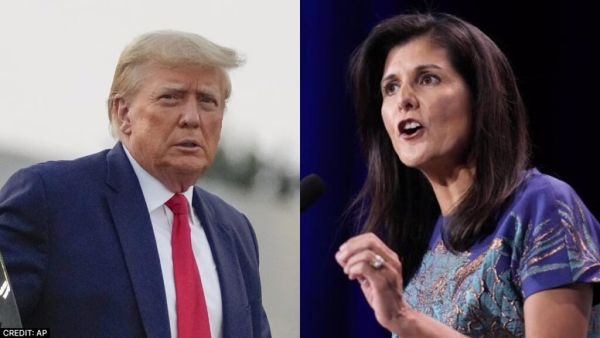

In a strongly worded warning to the Donald Trump administration, former United Nations ambassador Nikki Haley has highlighted the precarious state of US-India relations, urging caution to prevent trade disputes from undermining a partnership vital to countering China’s growing influence in Asia. With the Donald Trump administration recently imposing a series of tariffs on Indian imports, Nikki Haley’s op-ed in Newsweek, co-authored with Hudson Institute fellow Bill Drexel, underscores the strategic importance of India to the United States and cautions against treating India as an adversary rather than a key ally in the Indo-Pacific region. Her analysis comes at a moment of heightened trade tensions and geopolitical uncertainty, with US tariffs on Indian goods looming large and the broader global balance of power at stake.
Tariff Disputes and the Risk of Strategic Missteps
Nikki Haley’s intervention comes in the context of a rapidly escalating trade standoff between the United States and India. On August 6, 2025, US President Donald Trump signed an executive order imposing an additional 25 percent tariff on imports from India, citing concerns over India’s purchase of oil from Russia, whether directly or indirectly. This move followed a prior decision on July 31, when Donald Trump had already approved a similar 25 percent tariff on Indian goods. While Nikki Haley acknowledged that Donald Trump’s attention to India’s oil purchases was justified, she warned that the broader approach risked turning India—a country that has long been a strategic partner—into a perceived adversary.
In her op-ed, Nikki Haley emphasized that such trade measures could severely undermine nearly three decades of progress in US-India relations. She argued that allowing trade tensions to dictate the trajectory of the partnership would constitute “a strategic disaster,” especially given India’s role as a counterweight to China in Asia. Highlighting the economic and geopolitical stakes, she pointed out that India’s growing economic clout, technological capabilities, and manufacturing potential are critical to US interests in the region. The former envoy noted that India’s capacity to produce at scale in sectors such as textiles, affordable electronics, and solar panels makes it an indispensable partner for American supply chains that cannot easily or efficiently be replicated domestically.
Nikki Haley also raised concerns about the long-term implications of treating India with the same punitive approach often reserved for China. She cautioned that such a policy would not only alienate India but could push New Delhi closer to Beijing or other competing powers, thereby undermining US efforts to maintain a balance of power in the Indo-Pacific. By framing India as an adversary, the United States risks compromising a partnership that has been cultivated over decades through diplomatic, defense, and trade engagements.
India’s Strategic Role in the Indo-Pacific and Global Security
Beyond trade and economics, Nikki Haley’s op-ed highlighted India’s growing significance in global security dynamics. She emphasized that India’s expanding defense cooperation with the United States and its allies positions it as a crucial asset in maintaining stability and countering threats in the Indo-Pacific. According to Nikki Haley, India’s military capabilities, strategic location, and commitment to democratic values make it an indispensable partner for the free world.
Nikki Haley argued that US policymakers need to recognize India’s unique position and treat it accordingly. Unlike China, which has faced limited repercussions despite its large-scale purchases of Russian oil, India should be approached as a valued partner rather than a target of punitive tariffs. She urged the Donald Trump administration to elevate the bilateral relationship to the same level of attention and resources devoted to China or Israel, ensuring that policy decisions are guided by strategic considerations rather than short-term trade disputes.
In her advice to India, Nikki Haley suggested a pragmatic approach, encouraging New Delhi to engage constructively with the White House to address concerns over Russian oil imports. She recommended direct dialogue between Prime Minister Narendra Modi and President Donald Trump to resolve issues before they escalate further. According to Nikki Haley, timely diplomatic engagement could prevent a downward spiral in bilateral relations and safeguard the broader strategic partnership.
Nikki Haley also underscored the broader implications of a strained US-India relationship. She noted that India is uniquely positioned to provide a counterbalance to China’s dominance in Asia, both economically and geopolitically. By leveraging its manufacturing capabilities, growing technological base, and regional influence, India can support US objectives in the region, including securing supply chains, enhancing energy security, and strengthening regional alliances. A mismanaged trade dispute, she warned, could jeopardize these strategic advantages, creating long-term challenges for American foreign policy.
The op-ed also examined the political dimensions of the US-India relationship, emphasizing that effective engagement requires careful calibration of trade, defense, and diplomatic policies. Nikki Haley argued that treating India as a partner in shared strategic objectives, rather than a competitor, is essential to sustaining the momentum built over 25 years of bilateral cooperation. She highlighted that the United States and India share common values, including democracy, rule of law, and regional stability, which form the foundation for a durable strategic alliance.
Nikki Haley’s perspective reflects a broader consensus among strategic analysts that the US must prioritize India as a central player in Asia policy. She warned that failing to do so risks ceding influence to China, undermining efforts to maintain a free and open Indo-Pacific. By integrating India into supply chain planning, defense cooperation, and diplomatic outreach, the United States can leverage India’s growing capabilities to achieve strategic objectives that are increasingly critical in a multipolar world.
Moreover, Nikki Haley stressed the importance of high-level attention and resource allocation to nurture the partnership. She argued that incremental policy adjustments or unilateral trade measures are insufficient and potentially counterproductive. Instead, a sustained, multi-dimensional approach is necessary, encompassing trade, investment, technology collaboration, and defense ties. According to Nikki Haley, the Donald Trump administration’s focus should be on mending the rift and ensuring that bilateral relations are reinforced at the highest levels of government.
Her op-ed also drew attention to the contrast between India and China in terms of trade and sanctions. While China has been able to avoid the brunt of sanctions despite extensive purchases of Russian oil, India faces punitive tariffs that could distort perceptions of its role in the international system. Nikki Haley emphasized that treating India differently is not only strategically unsound but also risks sending the wrong message to other partners and allies in the region, potentially undermining broader US credibility.
Through her detailed analysis, Nikki Haley illustrated that the stakes of US-India relations extend beyond bilateral trade disputes. The partnership is integral to US efforts to maintain regional security, ensure economic stability, and counterbalance China’s assertiveness in Asia. She highlighted the interconnected nature of these issues, noting that trade tensions, if left unaddressed, could ripple across defense cooperation, diplomatic alignment, and regional influence, ultimately affecting the United States’ strategic positioning in Asia.
Nikki Haley concluded her intervention with a clear call for immediate action. She urged both the US and India to engage constructively and prevent avoidable damage to a relationship that is critical for strategic balance in the Indo-Pacific. By prioritizing dialogue, high-level engagement, and recognition of India’s unique strategic value, Nikki Haley argued, the United States can avoid a policy misstep with potentially long-term consequences.
The op-ed resonates with broader debates in Washington over how to manage complex relationships in Asia. Analysts and policymakers have repeatedly highlighted that India’s role as a regional power, its democratic credentials, and its economic potential make it a natural ally in countering China’s influence. Nikki Haley’s warning serves as both a reminder and a guidepost for policymakers, emphasizing that short-term trade measures must be balanced against long-term strategic objectives to safeguard American interests in the region.
In essence, Nikki Haley’s commentary reflects deep concern over the trajectory of US-India relations at a pivotal moment. She stressed that constructive engagement, careful diplomacy, and strategic prioritization are essential to preserving a partnership that not only benefits the two countries but also contributes to broader regional stability and the maintenance of a rules-based international order. Her warnings underscore the potential consequences of mismanaged trade disputes and the importance of treating India as the critical partner it is in the evolving geopolitical landscape of Asia.
The post Nikki Haley warns Donald Trump against straining US-India ties ahead of critical tariff deadline | cliQ Latest appeared first on CliQ INDIA.
-
Who is Nagma Mirajkar, influencer who has entered Salman Khan’s Bigg Boss, has featured in ad with Deepika Padukone?

-
What will happen if India does not buy oil from Russia, and how is India helping Russia?

-
June Wilkinson dead: Sussex-born model who dated Elvis Presley dies aged 85

-
Andhra Pradesh CM Naidu pays homage to Sudhakar Reddy

-
Bodies Of Youth And Woman Found On Railway Track In MP's Betul; Suspected Love-Linked Suicide
